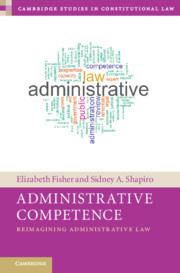Book contents
- Administrative Competence
- Cambridge Studies in Constitutional Law
- Administrative Competence
- Copyright page
- Dedication
- Contents
- Abbreviations
- Acknowledgments
- 1 The State We Are In
- Part I Making Administrative Competence Visible
- Part II Confronting the Origin Myths of Administrative Law
- 4 Enlightened Foundations
- 5 Debating Administrative Competence
- 6 The Emergence of Administrative Law and the Limits of Legal Imagination
- 7 The Narrowing of the Administrative Law Imagination
- Part III The Law of Public Administration
- Bibliography
- Index
7 - The Narrowing of the Administrative Law Imagination
from Part II - Confronting the Origin Myths of Administrative Law
Published online by Cambridge University Press: 02 October 2020
- Administrative Competence
- Cambridge Studies in Constitutional Law
- Administrative Competence
- Copyright page
- Dedication
- Contents
- Abbreviations
- Acknowledgments
- 1 The State We Are In
- Part I Making Administrative Competence Visible
- Part II Confronting the Origin Myths of Administrative Law
- 4 Enlightened Foundations
- 5 Debating Administrative Competence
- 6 The Emergence of Administrative Law and the Limits of Legal Imagination
- 7 The Narrowing of the Administrative Law Imagination
- Part III The Law of Public Administration
- Bibliography
- Index
Summary
In 1975, a young administrative law scholar, Richard Stewart, published “The Reformation of American Administrative Law” in the Harvard Law Review.1 His 150-page narrative is a grand portrayal of a dramatic shift in the nature of administrative law. According to this narrative, the traditional understanding of administrative law, which Stewart called the “transmission belt model,”2 was “essentially a negative instrument for checking government power,”3 aimed at the management of “the problem of discretion.”4 Harkening back to the idea that the New Dealers saw expertise as a solution for this discretion, Stewart allowed that expertise “could plausibly by advocated as a solution to the problem of discretion,” but only if the “agency’s goal could be realized through the knowledge that comes from specialized experience,”5 which Stewart doubted was possible.6
- Type
- Chapter
- Information
- Administrative CompetenceReimagining Administrative Law, pp. 181 - 214Publisher: Cambridge University PressPrint publication year: 2020

